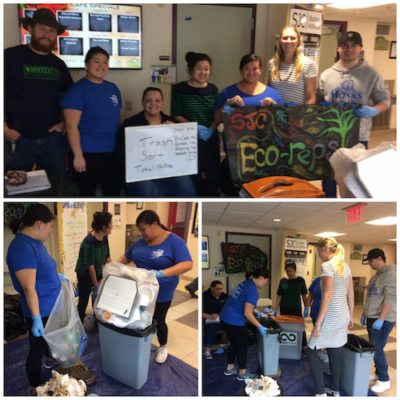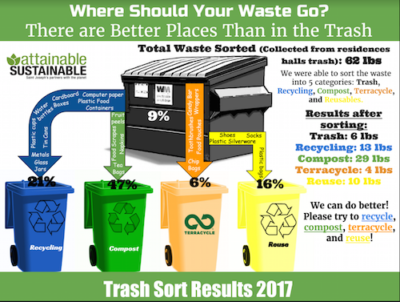You’ve just enjoyed an excellent meal with your friends on campus and are cruising out the door to your next class. Your mind drifts off to thoughts about acing that biology exam, connecting with your friends for a weekend trip to the coast, and soaking up the warm weather that has finally arrived. But before any of these actions, you have a simple task: discard the containers and leftovers from your meal.
Plastic. Paper. Aluminum. Tin. Cloth. Rubber. Food scraps. There are lots of choices to make at this point and the easiest one—dumping all contents into the trash—is also the most harmful. That’s why Leia Berube ’18 organized a trash sort in Mercy Hall during lunch this spring to raise awareness about waste.
Berube, who is majoring in Environmental Science with a minor in Sustainability, serves as one of the college’s EcoReps—a group of students dedicated to issues like waste reduction and diversion, energy efficiency and conservation, health and wellbeing, and water conservation. Fellow EcoReps Olivia Marable ’18, Nhu Vo ’17, Caleb Gravel ’19, Aliyah Gregory ’17, Maria Liberti ’17, and Rebecca Barulli ’20 joined Berube—along with Environmental Educator Katrina Venhuizen from the nonprofit waste management company ecomaine—in sorting through 62 pounds of trash. The group shockingly discovered that only six pounds were truly garbage. The rest could be reused, recycled, composted, or donated to TerraCycle, which partners with individuals and organizations to divert millions of pounds of waste from landfills and incinerators each month.

“I think the results are important for the students, staff, and faculty to see how much of our waste is going into the trash, but can actually be composted, recycled, TerraCycled, and reused,” said Berube.
Michial Russell, farm manager at Pearson Town Farm, also led a composting demonstration called “Everything You Always Wanted to Know About Composting but Were Afraid to Ask” to educate the campus community about organic waste that can be composted, as well as single sort recycling.
Located on 474 acres along the shore of beautiful Sebago Lake in Standish, Maine, Saint Joseph’s College provides an ideal setting for studying a range of scientific disciplines, including biology, chemistry, and geology. Prospective students are encouraged to explore our Bachelor of Arts in Environmental Studies and our Bachelor of Science in Environmental Science. At Saint Joseph’s, sustainability is expressed as a deep respect for the earth through daily practices, decision making, and stewardship in a healthy and equitable way so that communities now and in the future can thrive. Read more about our commitment to sustainability.




